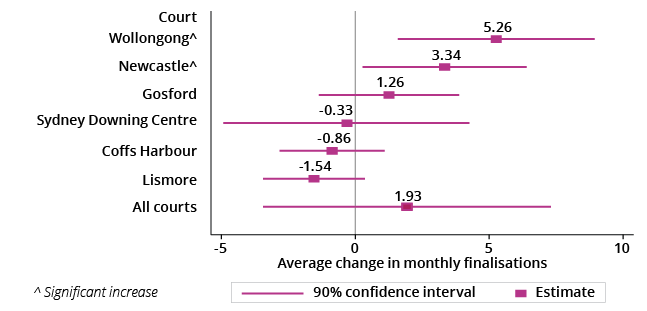Summary
Background
In February 2019, the NSW Government appointed seven new judges to the NSW District Court (the DC7 reforms) as a measure to address the rising number of pending criminal matters.
We examine whether the appointment of these judges resulted in an increase in the monthly number of finalised matters in the NSW District Criminal Court (DC).
To do this, we compare DC finalisations before and after the reforms for six NSW courts who also experienced an increase of at least 10 sitting weeks to eight NSW courts who did not experience any increase in sitting weeks following the reform. Monthly finalisations over the period 1 January 2014 to 30 September 2020 are examined.
Key findings
The appointment of the DC7 judges was associated with a significant increase of 3.34 finalisations per month in Newcastle and 5.26 finalisations per month in Wollongong DCs. However, there was no significant change in monthly finalisations in the Sydney, Gosford, Lismore, and Coffs Harbour DCs during the post-reform period.
Further analyses suggest that the benefits of the DC7 reforms may have been lower than expected because:
1. some courts reduced their reliance on acting judges;
2. the number of sexual assault and related matters, which tend to take longer to resolve, increased in some courts following the reforms.
A limitation of this evaluation is that trends in finalisations in the treated and control courts before the reform were different. This means that our estimates cannot be interpreted as causal effects.
Conclusion
While the DC7 reforms have only generated a small increase in the number of monthly finalisations in some courts, they appear to have reduced the NSW DC’s reliance on acting judges.
